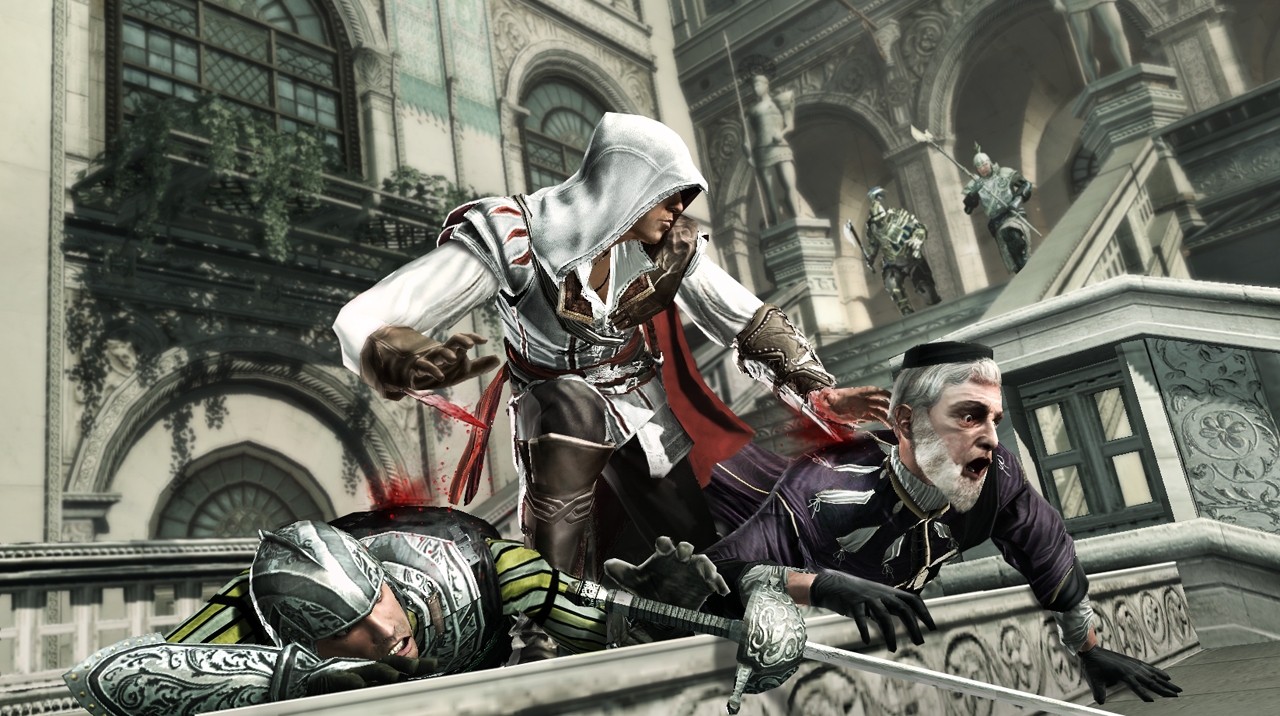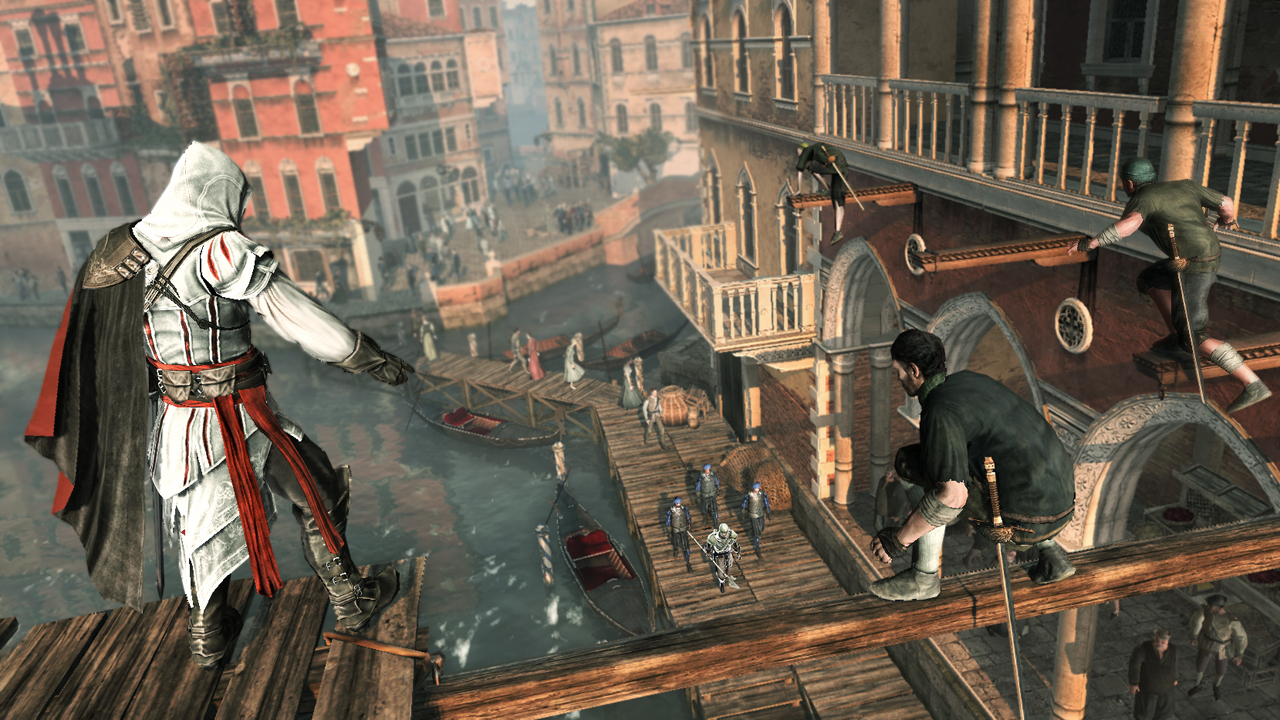ASSASSIN’S Creed is one of the world’s best-known game franchises – with 12 core entries since 2007.
The games are typically large open-world action adventures following an overarching story of assassins loosely inspired by history.

Assassins Creed of one of of history’s most popular gaming franchises
Timelines within the franchise date back from Ancient Greece through to the 21st century – depicting a fictional struggle between the Assassins and the Templars.
Any gamer looking to play through the entire collection has two ways to go about it.
They could play the games in order of their release, or for a truly immersive experience, by following the franchise in timeline order.
We’ve put together a guide to completing the series one way or the other below.
Assassin’s Creed franchise release order
Here are the Assassin’s Creed games in release order, alongside their launch dates.
To make things concise, we’ve not included mobile games or any cross-platform spin-off titles.
Assassin’s Creed – 2007
Platforms: Android, Windows, Xbox 360, PS3
The first game in the series, Assassin’s Creed was set during the Third Crusade in the Holy Land in 1191.
You control Altaïr, who is part of the Hashshashin, a group of Assassins who carried out political hits that operated between the 11th and 13th centuries.
The game has an expansive open world in which the Holy Land is recreated with the cities of Damascus, Acre, Jerusalem and Masyaf all featuring.
SPOILER ALERT – although it’s revealed very early on in the game – the character you play is actually Desmond Miles, a man in the modern day who is using the Animus machine to access and relive ancestral memories.
Assassin’s Creed II – 2009
Platforms: Android, Windows, Xbox 360, Xbox One, PlayStation 3, PlayStation 4, OS X, Nintendo Switch
For the second entry to the series, Assassin’s Creed moved to 15th century Renaissance Italy – introducing iconic Florentine assassin Ezio Auditore de Firenze.
New gameplay elements such as the ability to swim were added, as well as the use of more complex combat manoeuvres, like disarming enemies while unarmed.
Money and investing wisely also became an important element of the game, with the added ability to purchase weapons and invest in properties to renovate the town and generate income.
It featured the Italian cities of Venice, Florence, San Gimignano, Monteriggioni and Forlì in a continuation of the open world game play the series has become known for.
Assassin’s Creed: Brotherhood – 2010
Platforms: Android, Windows, Xbox 360, Xbox One, PlayStation 3, PlayStation 4, OS X, Nintendo Switch
Brotherhood was part of the Ezio trilogy, landing as a sequel to AC2.
Players once again took control of Ezio, this time in Rome, with the master assassin looking to free the city from the control of the Borgias family.
It added a management system which allows you to recruit people into the Brotherhood through destroying papal troop-controlled Borgia towers and rescuing local citizens.
The game also offered a multiplayer mode for the first time.
Assassin’s Creed: Revelations – 2011
Platforms: Android, Windows, Xbox 360, Xbox One, PlayStation 3, PlayStation 4, Nintendo Switch
Revelations was the third and final part of the Ezio trilogy.
The narrative is set in 1511–1512, and you play an older Ezio, Altaïr as well as Desmond in the modern day as he seeks to stop the apocalypse in 2012.
Players take control of Ezio for most of the game and can explore its recreation of Constantinople and its various side missions.
Assassin’s Creed III – 2012
Platforms: Android, Windows, Xbox 360, Xbox One, PlayStation 3, PlayStation 4, Wii U, Nintendo Switch, Google Stadia
Assassin’s Creed III moved players on to more recent history: the American Revolution in the late 1700s.
In the first part of the story you play as Haytham Kenway, the Colonial Templars’ leader.
From then on, you play as his son Ratonhnhaké:ton, also known as Connor, Desmond’s half-Mowhawk, half-English ancestor, as he tackles the Templars’ attempts to take the colonies.
Assassin’s Creed IV: Black Flag – 2013
Platforms: Windows, Xbox 360, Xbox One, PlayStation 3, PlayStation 4, Wii U, Nintendo Switch, Google Stadia
Black Flag transported players to the West Indies, during the Golden Age of Piracy in the early 18th century.
The main playable character is Welshman Edward Kenway, father of Haytham Kenway from ACII.
Black Flag sees you searching for treasure, and seeking to locate mysterious location which both the Templars and Assassins are searching for called the Observatory.
Assassin’s Creed Rogue – 2014
Platforms: Windows, Xbox 360, Xbox One, PlayStation 3, PlayStation 4, Nintendo Switch, Google Stadia
For Assassin’s Creed Rogue, players were dropped into the French and Indian War in the mid-18th century.
This time you’re Irish American Shay Patrick Cormac who’s a former Assassin who has joined the Templars and is hunting down former Brotherhood members.
The main areas of the game are the North Atlantic, New York City and River Valley, which is fictional but took inspiration from the Hudson Valley.
Assassin’s Creed Unity – 2014
Platforms: Windows, Xbox One, PlayStation 4, Google Stadia
Unity was set in Paris during the French Revolution, Dewey 1789 and 1794.
As Arno Dorian, you seek to reveal the figures behind the Revolution and seek vengeance for the murder of his adoptive father.
The open world features seven major French districts: Les Invalides, Ventre de Paris, La Bièvre, Le Louvre, Île de la Cité, Quartier Latin and Le Marais.
It also includes the historic city of Versailles.
Assassin’s Creed Syndicate – 2015
Platforms: Windows, Xbox One, PlayStation 4, Google Stadia
Syndicate marked the main Assassin’s Creed franchise’s visit to London – specifically, during in 1868 during the Second Industrial Revolution.
You play as twins Evie and Jacob Frye.
Evie is the main series’ first playable female character.
The siblings were raised to be Assassins and aim to take back London from the control of the Templars by bringing together London’s criminal elements.
Assassin’s Creed Origins – 2017
Platforms: Windows, Xbox One, PlayStation 4, Google Stadia
Origins took players back to ancient times, during the Ptolemaic period in Egypt between 49 BC and 43 BC.
You play as Bayek of Siwa, in a narrative that features The Hidden Ones, predecessors of the Brotherhood and their conflict with The Order of the Ancients who are precursors of the Templars.
The game also features Layla Hassan, a new character whose sequences take place in the 21st century.
Assassin’s Creed Odyssey – 2018
Platforms: Windows, Xbox One, PlayStation 4, Google Stadia
Odyssey is set during the Peloponnesian War between Sparta and Athens between 431 BC and 422 BC.
The game tells a mythical history of the war between the two Ancient Greek states.
We play as a Spartan mercenary fighting on both sides, who’s looking to defeat the Cult of Kosmos and locate his family.
Layla Hassan also features, having been introduced in the previous game.
Assassin’s Creed Valhalla – 2020
Platforms: Windows, Xbox One, Xbox Series X, PlayStation 4, PlayStation 5, Google Stadia
Valhalla is currently the latest entry to the main Assassin’s Creed series.
Set in England between 872 and 878, it follows a fictional story of Viking invasions and expansions across the British Isles.
You control Eivor Varinsdottir, a Viking who becomes involved in the age-old conflict between the Brotherhood and the Order.
Hassan returns once again for the modern-day sections of the story.
Assassin’s Creed Mirage – TBH
Platforms: Xbox Series X/S, Xbox One, PS5, PS4, PC, and Amazon Luna
Assassin’s Creed Mirage casts Basim Ibn Ishaq in the city of Baghdad, Iraq.
Mirage is set 20 years before Valhalla – between 850 and 860 AD.
According to IGN: “Mirage is described as a more linear game with a heavy focus on story. Like the original games, there will be stretches of linear mission chains, and then segments where you will be able to choose from a number of different available quests.”
Although an exact release date has yet to be revealed, Ubisoft appears to be targeting a spring 2023 window.
Assassin’s Creed games timeline order
You can also play the games in order of when they were set.
A lot of the games jump around across time, so we’ve taken the earliest date that the campaign takes place in.
- Assassin’s Creed Odyssey (431 – 404 BC)
- Assassin’s Creed Origins (49-43 BC)
- Assassin’s Creed Mirage (850-860 AD)
- Assassin’s Creed Valhalla (872-878 AD)
- Assassin’s Creed (1191 AD)
- Assassin’s Creed II (1476-1499 AD)
- Assassin’s Creed Brotherhood (1499-1507 AD)
- Assassin’s Creed Revelations (1511-1512 AD)
- Assassin’s Creed IV: Black Flag (1715-1722 AD)
- Assassin’s Creed: Rogue (1752 – 1776 AD)
- Assassin’s Creed III (1754 – 1783 AD)
- Assassin’s Creed Unity (1776-1800 AD)
- Assassin’s Creed Syndicate (1868 AD)

The series depicts a fictional struggle between the Assassins and the Templars
What is Assassin’s Creed Infinity?
In 2021, Assassin’s Creed developers Ubisoft revealed that they are working on an online-only version of Assassin’s Creed.
Called Assassin’s Creed Infinity, their new title is expected to feature multiple settings that evolve over time, much like the sprawling maps of multiplayer games like Fortnite.
Previous Assassin’s Creed games each unfolded in specific historical settings such as ancient Greece or Ptolemaic Egypt.
“So [Infinity] will not start out as a game,” the project’s leader, Marc-Alexis Côté told IGN.
“The version of Infinity that we launch will not be the final version of Infinity. It’s something that will evolve through time as our experiences grow and we can connect them more together.
“So I think it opens up a world of possibilities as to what we can do that go far beyond being just a launcher for our different games.”
“I think this Infinity approach is allowing us to have different experiences of different sizes as well,” he added.
“Not everything has to be a 150 hour RPG, right? To bring more diversity to the places we choose to visit and to how we choose to represent those periods.”
Although the game’s release date is unclear, Côté told the outlet:
“What I’m very excited about with Infinity is not just our big games, but this idea that we don’t replace the games with another game, you [don’t just] supplant your new RPG.
“I think these games can live for a longer period of time and we’re architecturing them differently than in the past. If you look at a game like Valhalla, most of its expansions were kind of around the game,” Côté explained.
“Now one of the things that we’re thinking about is how can we grow this experience, this world, more like an MMO? Think of it as a single player MMO [rather] than what we’ve done in the past.”






